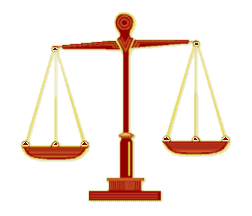Reasonable doubt facts for kids
Imagine you are trying to solve a puzzle. When you are "beyond a reasonable doubt," it means you are very, very sure about the answer. In a court of law, this is the highest level of certainty needed for a jury to decide if someone is responsible for a serious action. It means there should be no big, sensible questions left in their minds about what happened.
Usually, the person or team trying to show that something happened (called the prosecutor) has to prove their side of the story. They need to show enough evidence so that a normal, thinking person would not have any important doubts. If a jury has a strong, sensible question about whether the person (called the defendant) did it, then they are not "beyond a reasonable doubt."
It's okay to have a tiny bit of doubt, like a small "what if." But this small doubt should not change what a reasonable person believes. If the doubt is big enough to make a reasonable person wonder if the defendant is truly responsible, then the jury cannot say they are sure "beyond a reasonable doubt."
Sometimes people say "beyond a shadow of a doubt." This sounds like it means the same thing, but it's actually much harder to prove. It means absolutely no doubt at all, which can be almost impossible to achieve. That's why "beyond a reasonable doubt" is the term most often used in courts.
Why This Standard Is Important
The idea of "beyond a reasonable doubt" is very important for fairness. It helps protect people who might be innocent. A famous saying by a wise person named William Blackstone explains this well: "It is better that ten guilty persons escape than that one innocent suffer." This means it's more important to make sure an innocent person is not wrongly blamed than to make sure every single person who did something wrong is found responsible. This high standard helps make sure that only those who are truly proven to have done something are found responsible.
What "Reasonable" and "Doubt" Mean
The exact meaning of "reasonable" and "doubt" can be a little different depending on the country and its specific laws. But generally, "reasonable" means something that makes sense to a normal, thinking person. It's not just a silly or made-up doubt. "Doubt" means a feeling of not being sure or having questions. So, "reasonable doubt" is a serious and sensible question that stops a person from being completely sure.
See also
 In Spanish: Duda razonable para niños
In Spanish: Duda razonable para niños
 | Delilah Pierce |
 | Gordon Parks |
 | Augusta Savage |
 | Charles Ethan Porter |


